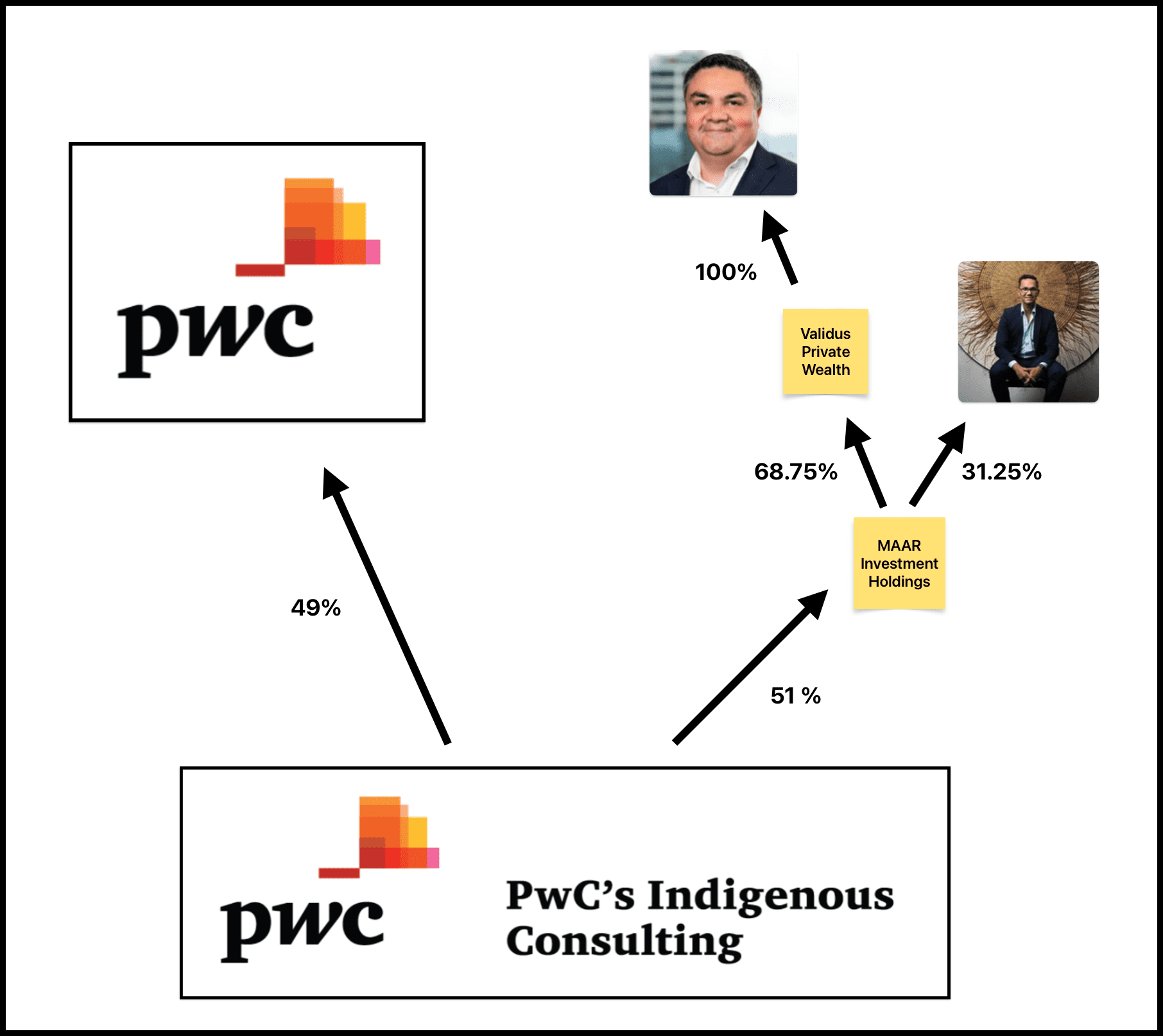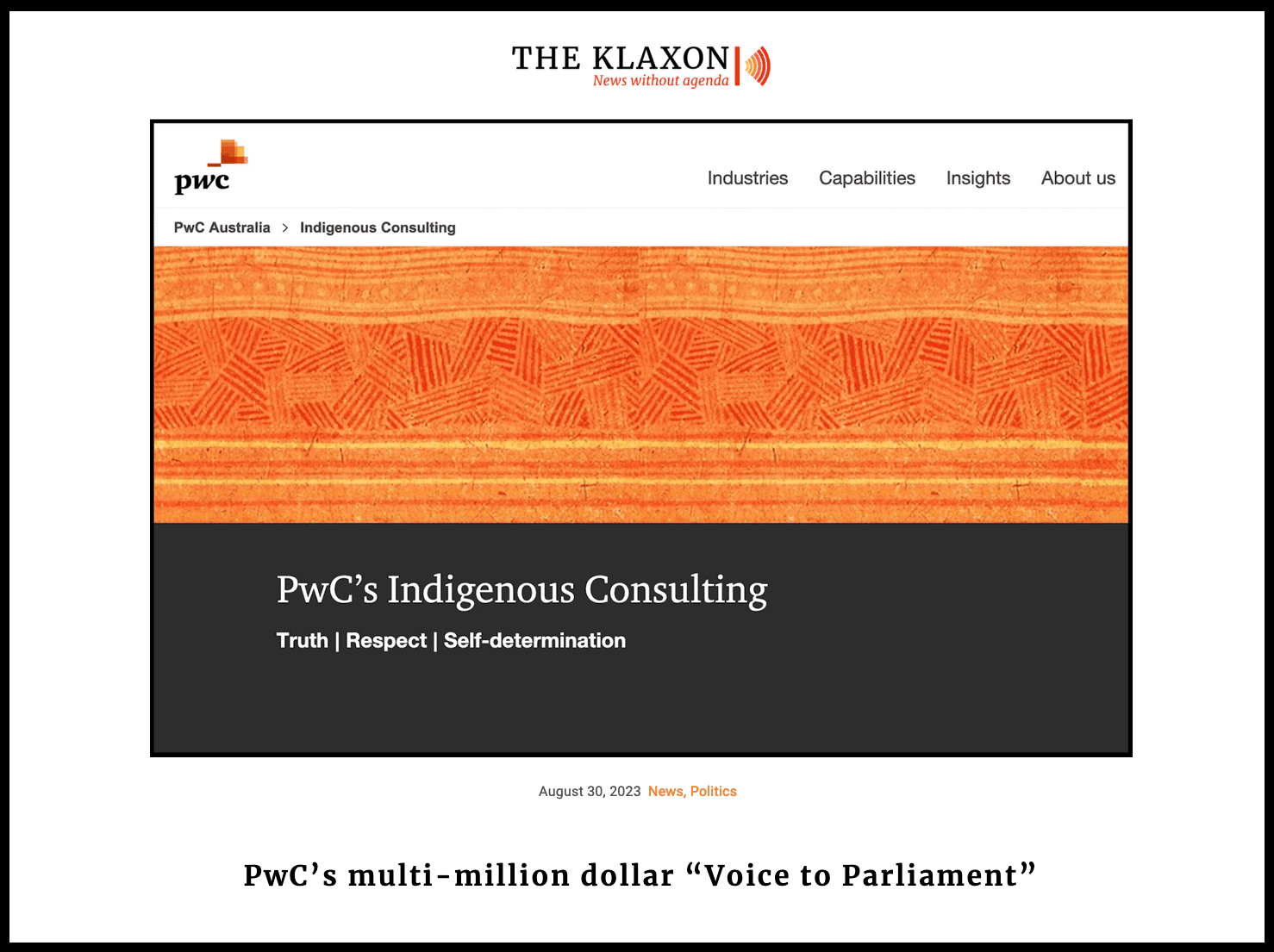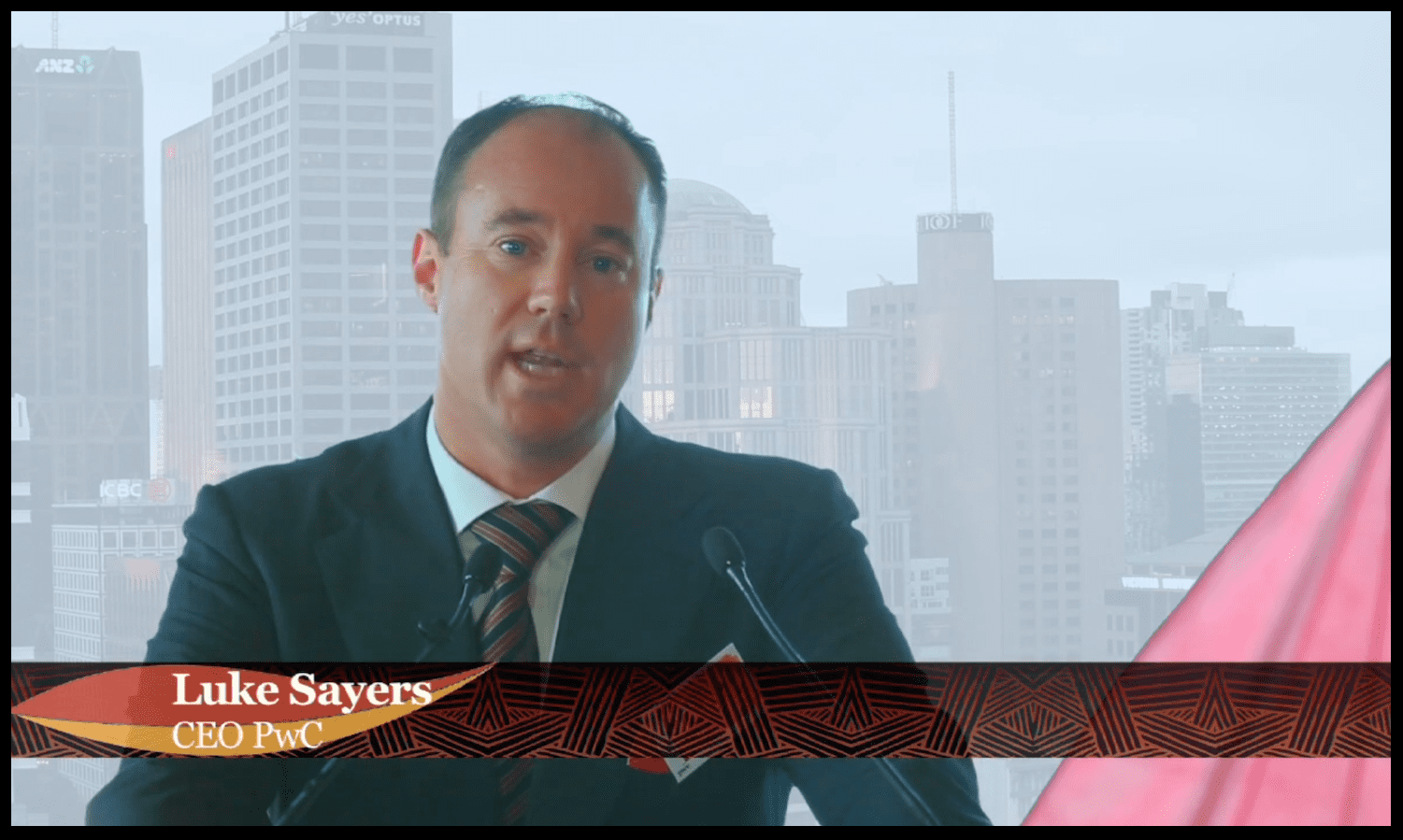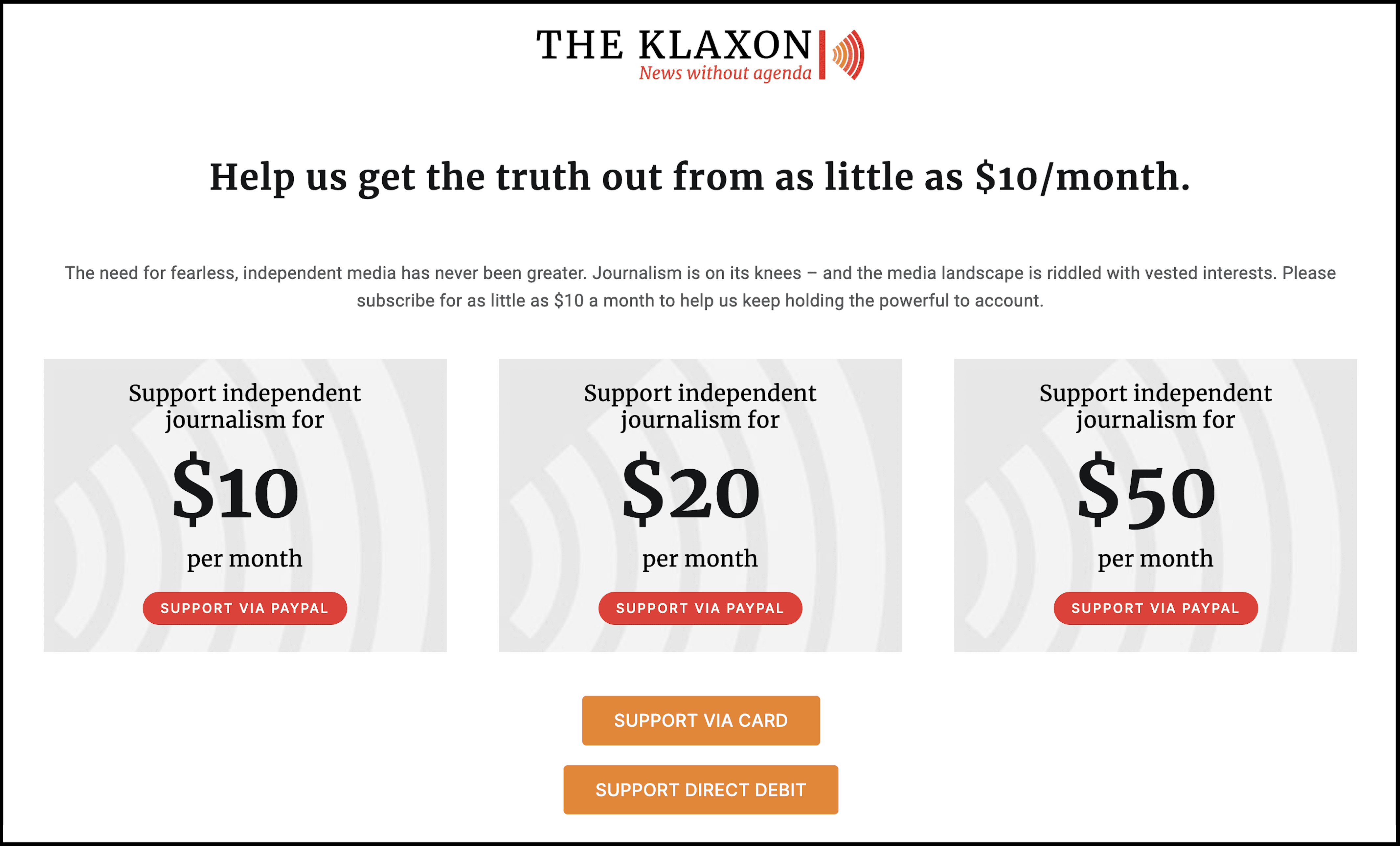SUPPORT
A secretive “review” by the Department of Finance has paved the way for PwC Australia’s partners to unlock the profits from tens of millions of dollars of taxpayer contracts over the past decade.
The Department of Finance’s “review” and subsequent greenlighting of “PwC’s Indigenous Consulting” (PIC) vastly improves the saleability of the business, which PwC is reportedly offering around the market.
PIC CEO Gavin Brown has previously told The Klaxon PIC has “never declared or paid a dividend”.
That means the profits from its $45 million-plus in Federal Government contracts since 2013 — including $13.78m in 2022 alone — remain inside the entity, and will flow to PIC’s owners upon sale.
The likelihood of a sale — although it hasn’t happened yet, company searches show — is greatly improved by Finance’s shock greenlighting of PIC, announced the same day as $711,554 in new Federal contracts.
PIC is 49% owned by PwC Australia (and so PwC Australia’s partners), with the remaining 51% owned by Brown (35%) and former public servant Selwyn Button, both Indigenous.
That structure allows PIC to be given “limited tender” Federal contracts intended for small Indigenous businesses (“at least 51%” Indigenous ownership is required).
Government procurement site AusTender shows that since PIC was created it has been given “limited tender” contracts — meaning the work is not offered to others — worth over $10m.
PIC is almost entirely dependent on taxpayer funds, the vast majority via Federal contracts.
Please support our quality journalism by CLICKING HERE

Ownership structure of PwC’s Indigenous Consulting. Source: ASIC Graphic: The Klaxon
In March last year, with the Federal Government under intense public pressure over the PwC tax leaks scandal, Finance issued what was reported as an “effective ban” on PwC.
PwC “divested its government business”, of 1,400 PwC partners and staff, for $1 to private equity group Allegro, which rebranded it Scyne Advisory.
On May 2, as exclusively revealed by The Klaxon and Crikey, Finance quietly issued a new “procurement policy note”. It not only opened the door to PwC again being given Federal contracts — and as soon as December 1 — but stated that Finance had conducted a “review” into PIC and had given it the all clear.
“Finance has…conducted a review into PwC Indigenous and found that it was appropriate for the Commonwealth to continue engaging with PwC Indigenous,” it states.
Finance provided no further information. It is refusing to release the “review”, to say who at Finance conducted it, how long it took, or even what specifically it looked at or found.
In October last year, like PIC, Finance greenlit Scyne Advisory to be given Federal contracts. (The PwC—Allegro “sale” was finalised the next month).
Yet in direct contrast to PIC, Finance released its “review” into Scyne Advisory – publishing a 24-page document: “Finance’s review of the ethical soundness of Scyne Advisory”.
As previously revealed, the secretive PIC “review” was “finalised” just days before the Senate inquiry into PwC was to make public its findings on PwC, after an extensive, year-long probe, that included ten public hearings.
The 48-page report, titled “PwC: The Cover-up Worsens the Crime”, found PwC Australia was engaged in an ongoing “cover-up”, had failed to “genuinely change” and made “no genuine effort to fully investigate and address the issues”.

PwC has its own multi-million dollar “Voice” to parliament. Source: The Klaxon
Department of Finance Secretary Jenny Wilkinson is refusing to explain why Finance gave PIC the green light immediately before the detailed Senate report was due to be made public.
Wilkinson, who receives a taxpayer salary of $765,916, also refused to comment when asked whether she had approved the decision to greenlight PIC.
It has further emerged the Albanese Government has given Wilkinson’s Finance “responsibility for managing the Commonwealth’s response” to the PwC scandal.
Finance’s May 2 “procurement policy note” states that is to “ensure a coordinated and efficient approach across the Commonwealth”.
“Finance has taken responsibility for managing the Commonwealth’s response…and forming a whole of government view on PwC Australia’s ethical soundness,” it states.
That means it will be Finance — via another of its “reviews” — that decides whether the Australian Government will once again award contracts to PwC Australia, as early as December 1.
Last week, the ABC followed our exposes regarding the greenlighting of PIC and Finance opening the door to new PwC Australia contracts from December 1.
Finance also refused to provide the ABC with its PIC “review”.
Citing The Klaxon’s expose, the ABC report said a Finance “spokesperson” had provided it with the following response:
“The Department has not released a summary of its examination of PricewaterhouseCoopers Indigenous Consulting (PIC).
“Finance’s examination found that PIC exhibited a significantly different governance and operating structure to that which exists within PwC Australia, with a greater focus on transparency and that PIC has the appropriate structural and cultural standard”.

PIC’s “Elevate Reconciliation Action Plan”. Source: PwC’s Indigenous Consulting
Since the PwC tax scandal broke, PwC — and later Finance — have claimed PIC is “separate” to PwC.
That’s despite PIC’s name — “PwC’s Indigenous Consulting” — that it’s based in PwC’s Sydney headquarters, that is has PwC partners for directors, and it sharing PwC’s website.
Finance has provided no evidence to back its claim that PIC has a “significantly different governance and operating structure” to PwC; its claim that PIC has “the appropriate structural and cultural standard”; or its claim that PIC has a “greater focus on transparency” than PwC.
The value of PIC is difficult to determine. That’s in large part because the entity — despite receiving tens of millions of dollars in taxpayer funds — is not required to file annual accounts.
The Klaxon has asked Brown to provide us with a copy of PIC’s latest annual report in the interests of “transparency”.
Brown refused.
PIC was founded in 2013 by Luke Sayers, who was PwC Australia CEO from 2012 to 2022 and so for the entire tax leaks affair.
Last year it was revealed PwC Australia took confidential tax policy data — gleaned while providing advice on preventing multinationals avoiding Australian tax and used it to create schemes to help multinationals avoid Australian tax.
A criminal investigation by the Australian Federal Police remains ongoing, as does a string of investigations by government’s Tax Practitioners Board, as well as investigations by US authorities.

Luke Sayers launching PwC’s Indigenous Consulting in 2013. Source: PwC
Sales Block
On March 17, citing The Klaxon’s previous PIC exposes, the Australian Financial Review reported PwC was seeking buyers for its 49% PIC stake.
“Sources say PwC recently sought buyers for the firm’s minority stake in PIC, sending out expression-of-interest materials to rivals, private equity suitors and Indigenous business groups,” it said.
“Unlike the $1 phoenix-y move to offload the firm’s government business to Allegro to set up Scyne advisory…Burrowes and PwC Australia want a more market-appropriate sum for the stake, assigning the Business Recovery Services team to assess its value”.
PIC’s structure — giving it access to limited tender contracts for small Indigenous companies — was reportedly a draw card.
“That’s what Burrowes and the PwC deals team want the buyers to pay up for,” the article states.
Finance appears to have been assisting PwC in its sale plans, behind-the-scenes, as early as mid-March.
“One source at PIC said the department has already sent the PwC-adjacent unit (PIC) a letter clearing them to push on,” the AFR March 17 article states.
On March 26 — the day before the Senate inquiry released its PwC report — a Finance “spokesperson” told The Klaxon it had conducted a “review” into PIC and “concluded it was appropriate for the Commonwealth to continue engaging with (PIC)”.
The statement said Finance said it had “finalised” the “review” in “March”, but Finance refused to say when in March, or why it had done so before the widely anticipated Senate report.
The companies register shows PwC is yet to sell any of its stake in PIC.
PwC remains biggest owner of PIC (49%), followed by Brown, who owns his 35% stake via his company Validus Private Wealth, and Button (16%).
BEFORE YOU GO: As you can see from the above, truly independent, quality journalism is vital to our democracy. Please SUPPORT US HERE.
Help us get the truth out from as little as $10/month.
Unleash the excitement of playing your favorite casino games from the comfort of your own home or on the go. With real money online casinos in South Africa, the possibilities are endless. Whether you’re into classic slots, progressive jackpots, or live dealer games, you’ll find it all at your fingertips. Join the millions of players enjoying the thrill of real money gambling and see if today is your lucky day!
The need for fearless, independent media has never been greater. Journalism is on its knees – and the media landscape is riddled with vested interests. Please consider subscribing for as little as $10 a month to help us keep holding the powerful to account.






